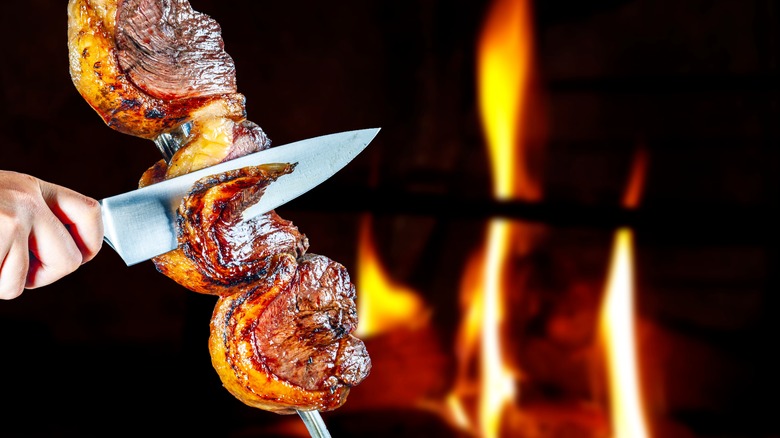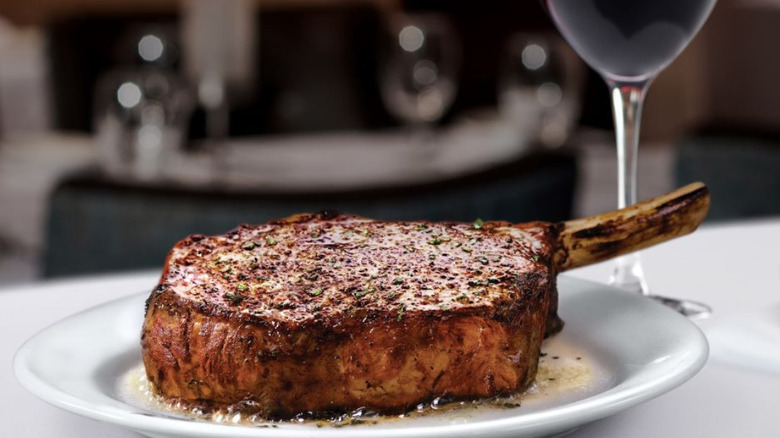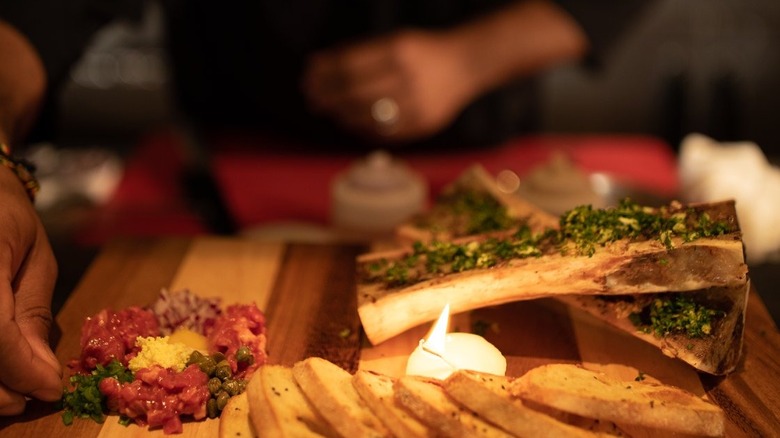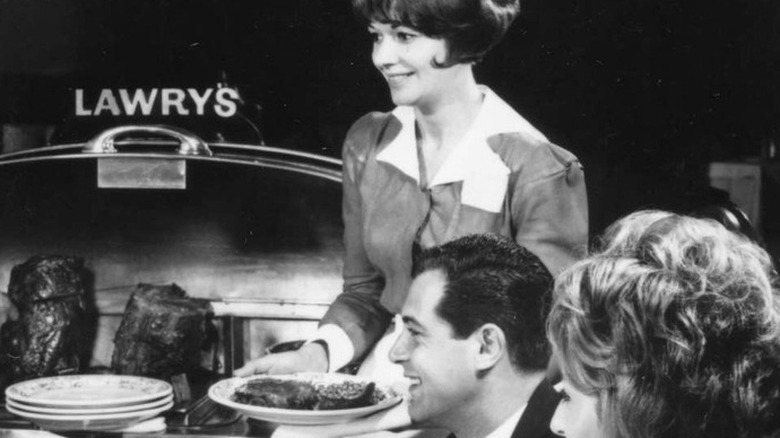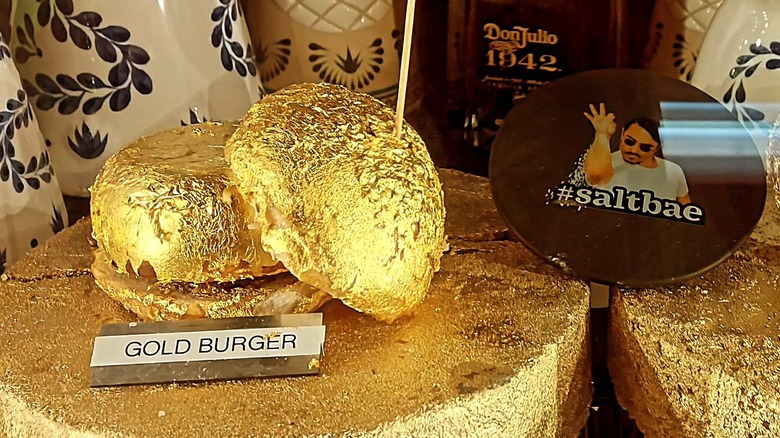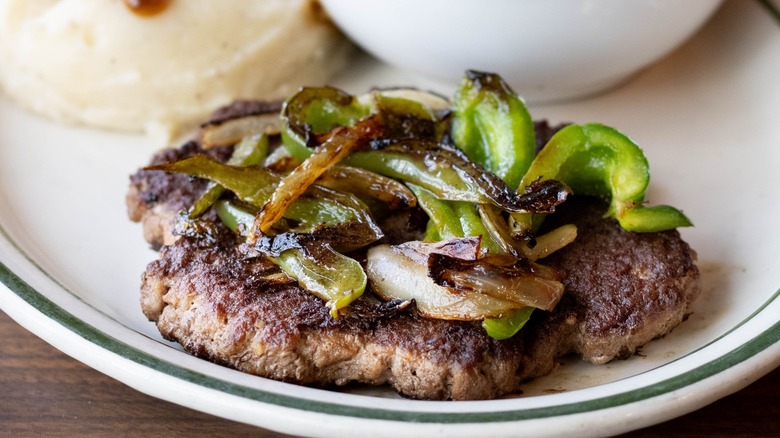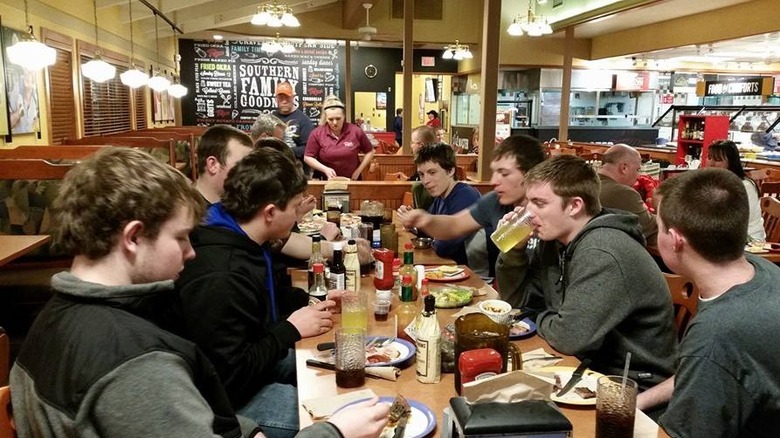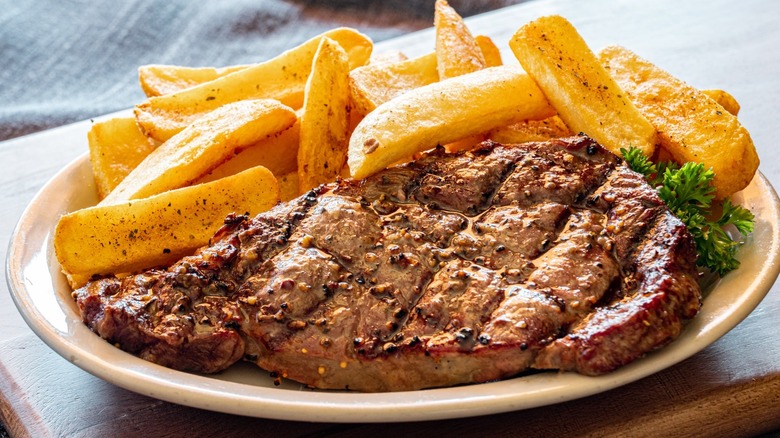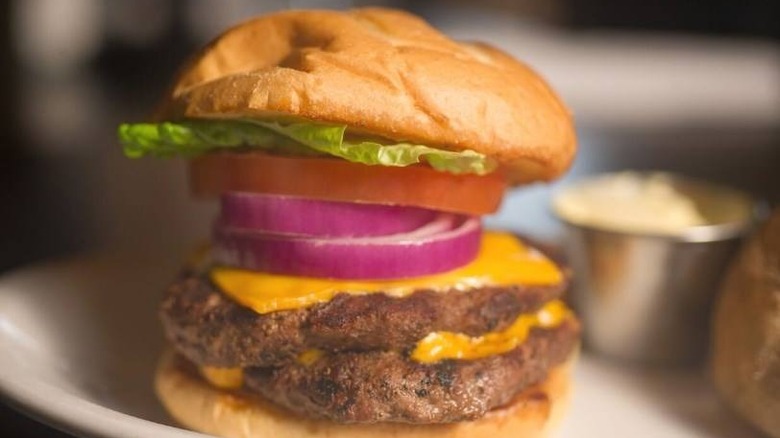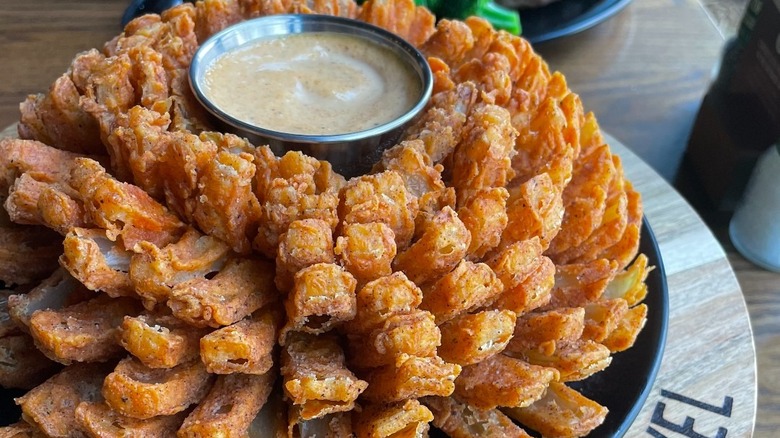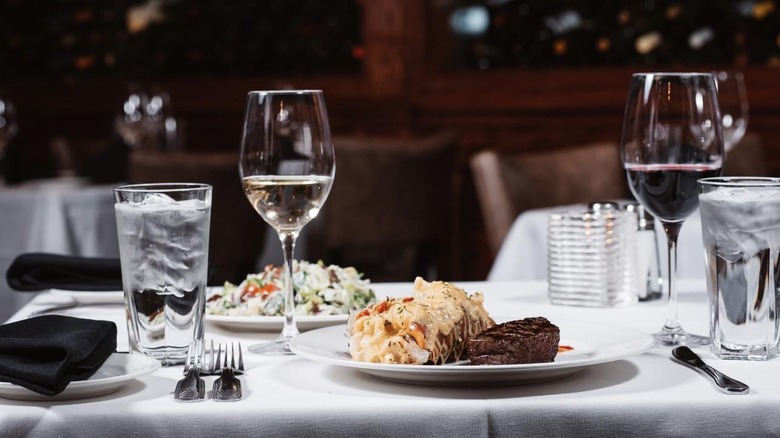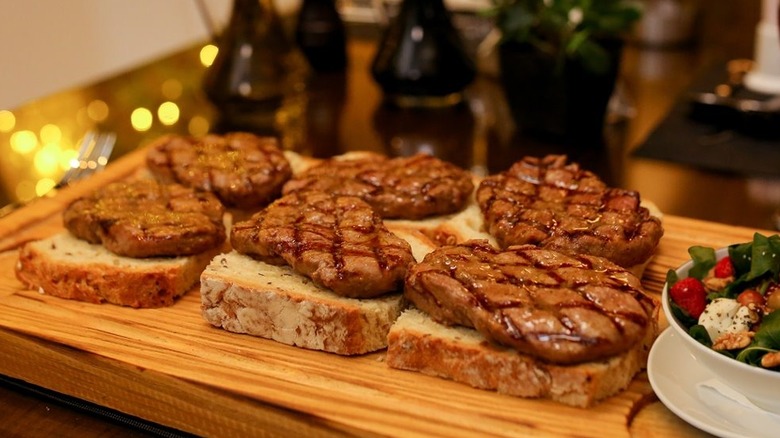Big Scandals That Completely Shook Popular Steakhouse Chains
When the craving for a perfectly cooked and juicy slab of beef comes knocking, there's nothing quite like a trip to your local steakhouse to scratch the itch. As the name suggests, the restaurant specializes in steaks, prime rib, and sometimes poultry, and has become a popular dining preference for meat lovers everywhere. Naturally, chain restaurants have popped up in response, and choices about where to get your next grilled steak or seared sirloin abound.
But running a popular steakhouse — let alone a steakhouse chain — comes with a certain amount of risk and a few downsides. Cooking and serving meat to large amounts of people daily and maintaining an employee base of hundreds (or even thousands) of workers means that if one little thing goes wrong, you can expect increased publicity surrounding the event. As you can expect, many of the popular steakhouse franchises we know, and love have been met with their fair share of challenges, accusations, and scares — all of which were put on blast for the whole world to see. From food poisoning to legal battles to harassment and more, here are some of the biggest scandals that completely shook popular steakhouse chains.
Ruth's Chris
2020 was an absolutely brutal year to be in the restaurant business. With COVID-19 came regulated shutdowns and a loss of income for many hard-working members of society. Thankfully, the government swooped in with a little assistance, providing loans for struggling, qualifying small-business owners under the Paycheck Protection Program. While this was life-saving for your mom-and-pop stops, many were furious that some larger franchises cut corners and took advantage of the PPP.
One of the offending chain restaurants was none other than Ruth's Chris, the popular steakhouse chain with over 150 locations under its belt worldwide. Given that the chain grossed over $505 million in total profits in 2022, according to CNBC, it doesn't quite give the appearance of being the flailing small business for which the government grants were intended. Regardless, Ruth's Chris managed to snatch up $20 million in funds using an arbitrary loophole; the number of employees at each location, which was less than 500, qualified them from a technical standpoint. The chain was immediately criticized for what many claimed to be a less-than-ethical action, and a massive change.org petition spread like wildfire. Signers were ultimately victorious — Ruth Chris paid back the $20 million, but the scandal left a decidedly bad taste in many consumers' mouths that was not from the steak.
Fleming's Prime Steakhouse and Wine Bar
There's no doubt about it; restaurant servers work hard. With all of the running to and fro, wiping down tables, balancing multiple orders (sometimes on trays), and impatient customers to contend with, at the end of the day, we like to think of each and every one of them heading home with a hefty stack of hard-earned tips in their pocket.
But one steakhouse called Fleming's Prime Steakhouse & Wine Bar, a chain 64 locations strong, became the target of public rage for refusing to recognize their employees' hard work in one of the cruelest ways — by robbing them of their gratuity. In May 2022, a former server filed a lawsuit against the company, claiming workers in front roles such as bartenders and servers were made to perform a disproportionate amount of behind-the-scenes tasks, like dishes or kitchen prep — chores in which they could not earn tips. And the tips were relied upon — even necessary — to make a liveable wage, considering the employees' hourly rate was only $2.13, according to Reuters. Ouch. Regardless of the outcome of the lawsuit, which appears to still be ongoing, lowballing one's employees is never a good look.
Lawry's Restaurants, Inc.
There are multiple restaurants that, even in 2023, still maintain a business model that centers around a female-only serving staff. Hooters, for example, only hires women as servers and hostesses, as does the Texas-based chain Twin Peaks. But would you believe that a higher-end steakhouse, for many years, did the exact same thing?
It's true. In 2006, the California-based Lawry's Restaurants, Inc. (the company behind Lawry's The Prime Rib, Tam O'Shanter, and Five Crowns) was sued by the U.S. Equal Employment Opportunity Commission after a busboy working at one of its exclusive steakhouses was barred from promoting to a more lucrative position of waiter because he was male. The claim was that the popular restaurant had been doing the same thing for decades and that such discriminatory actions were not allowed under the Civil Rights Act of 1964. Still, Lawry's is certainly not the only chain to do the same thing, as we know.
While both Hooters and Twin Peaks have had similar lawsuits brought against them over the years, they continue being allowed to hire all-female wait staff — allegedly using a loophole to do so. In the case of Lawry's, however, the plaintiff was actually successful; the restaurant was ordered to pay over $1 million in settlement money. Following this, the company also signed a legal decree in 2009 declaring its dedication to changing its antiquated and unfair policies and including men in its wait staff.
Nusr-Et
The international steakhouse sensation, Nusr-Et (otherwise referred to by its internet hashtag, Salt Bae), can be found in the U.S., Istanbul, Dubai, England, and Abu Dhabi, among other countries. The eccentric creator, Nusret Gokce, gained fame for his unique videos on social media, which featured him preparing meat by enthusiastically sprinkling pinches of salt on the cuts. Eventually, the Turkish chef founded his very own string of successful worldwide restaurants, and the rest is history.
The restaurants may be shrouded in luxury, drawing famous personalities like Leonardo DiCaprio and David Beckham to its doors. In the back of the kitchens, things are hardly so glamorous. The chef has been referred to as a tyrant by former employees. With multiple different lawsuits brought against him and his restaurants for issues like aggression, sexual harassment, discrimination, tip laundering, and refusal to pay overtime, as well as his propensity for firing workers on a whim, the shoe certainly seems to fit. This string of scandals has not gone unnoticed by consumers — the people who made him famous in the first place. "He's so slimy," said an alleged customer on Reddit. "He pays his workers jack s*** while charging $5000 for a steak. He's a grifter." Another stated: "I feel like he looks at food just as a money maker and not something he cares about. Also, the news that he doesn't treat or pay his workers well is just abhorrent."
Hoss's Steak and Sea House
Hoss's Steak and Sea House has been providing the masses with perfectly cooked steaks, shrimp, and burgers since 1983, but in 1995, something a little different was allegedly served up fresh out of the fryer. Two female employees of Hoss's filed a lawsuit against the steakhouse chain, claiming that not only were they fondled by their managers and sexually harassed by other members of the staff — but that a Barbie doll was stabbed and maimed before being deep-fried in front of them. They also claimed that they were awarded with less than desirable hours and shifts when they complained about the treatment.
This bizarre scenario led the restaurant chain and two women to federal court, where a magistrate validated the claims of sexual mistreatment and emotional turmoil afflicted by the restaurant. She rejected, however, the accusations regarding the connection between the events and the women's supposed schedule changes. Still, we wonder if the disturbing visual of a cooked Barbie is one that haunted regular consumers to the chain following the off-putting and peculiar incident all those years ago.
Ryan's Family Steakhouse
We like to think of issues such as racism or sexism as being left in the past where they belong, but all too often, this isn't the case. These detestable notions persist — sometimes, behind the scenes at our favorite restaurants. Such was the case with Ryan's Family Steakhouse in 2009 when it was revealed to the shock and horror of many that its workers were being wrongly treated differently for their gender and the color of their skin.
The U.S. Equal Employment Opportunity Commission took Ryan's to bat, claiming racist and sexist treatment on behalf of seven different former employees of the chain steakhouse. Black employees had supposedly been fired because of their race, while white employees who fraternized with them were referred to as being "race traitors," along with other horrendous terms, by management staff. Female employees were terrorized physically, called offensive names, and sexually harassed. Ultimately, Ryan's was ordered to pay a total of $500,000, which was split among the employees involved in the case.
Whether or not this stain on its reputation had anything to do with the struggles Ryan's faced over the next few years, we can't be sure. All we know is that three years later, in 2012, the company that operates Ryan's — Buffets, Inc. — was forced to close a whopping 81 locations for reportedly underachieving. Coincidence? We wonder.
Ponderosa steakhouse
Ponderosa Steakhouse, which started in Kokomo, Indiana, in 1968, used to dominate the beef-and-burger restaurant industry. According to the Indiana-based radio station 99.5 WKDQ, it had 736 steakhouse locations under its belt by 1989 — an impressive feat for any food chain, to be sure. Nowadays, however, there are less than two dozen that remain open. While challenges relating to the COVID-19 pandemic have almost certainly contributed to the shrinking of the once-popular chain, there was also an incident in the early 2000s which couldn't have helped matters, either.
It all started with a Ponderosa manager named Fred Boukzam. Boukzam, who ran 15 different Ponderosa Steakhouse locations, reportedly used his work accounts to illegally float a whopping $824 million worth of checks in less than two years. The company lost so much money as a result that multiple locations were forced to close their doors for good. Though the crooked manager was sent to prison for felony bank fraud, the damage had most certainly been done — with handfuls of employees losing their jobs overnight through no fault of their own. Talk about a damper on your steak dinner.
Ribeyes Steakhouse
Ribeyes Steakhouse is a regional chain popular in North Carolina for its flavorful shrimp skewers, pork chops, baked potatoes, and gigantic Ribeye steaks. Consumers consistently praise the spot for its decent prices and apparently awesome wait staff. "We stumbled upon this place and were glad that we did," reads a review on TripAdvisor. "Our server was great [...] What a personality."
But even a wonderful waitperson can't make up for a bout of food poisoning. In 2012, the blame for a widespread case of salmonella in Nashville, North Carolina, was placed at the feet of the beloved chain. A large-scale interview occurred involving 75 people who all divulged that they had eaten at Ribeyes Steakhouse either on or close to April 29. Though ultimately unproven, the link was pretty powerful evidence. Coming down with salmonella by way of steak is rare, as it only needs to be cooked to 135 degrees Fahrenheit. The disease occurs much more easily by way of burgers since they are constructed using ground meat — an ongoing and well-known harborer of the illness. And burgers are, of course, on the menu at Ribeyes — though how often they were ordered post-April 2012, we can't be sure.
Outback Steakhouse
Outback Steakhouse is one of the most well-known steakhouses on earth, with 1,001 locations worldwide, according to Statista. With creative, Australian-themed dishes such as Kookaburra Wings, Grilled Shrimp On The Barbie, or the chain's timeless, signature Bloomin' Onion, you'd be hardpressed to find a person who doesn't have a favorite item on the popular restaurant's fun menu.
But having such a large customer base can sometimes come with a price. The more people who eat, the higher the chances that something could go wrong — and in 2012, a woman hurled an accusation at Outback, claiming something had indeed gone very wrong. Kathleen Nicholson boldly took the restaurant to trial after surviving a horrible salmonella infection that left her hospitalized. Her vomiting — a telltale symptom of the illness — had begun, she claimed, just a few hours after eating a meal with family members at Outback. While the plaintiff felt the timing was proof in and of itself, the court ultimately determined it was not enough to show, without a shadow of a doubt, true causation for her illness. Given Nicholson's inability to prove whether or not her infection came from any of the other foods she ate earlier that day before her meal at Outback, the case was dismissed due to lack of evidence. We're sure this was a relief for the restaurant and all the Bloomin' Onion-loving consumers out there, too.
Kirby's Steakhouse
The United States is a tipping culture — handing a bill to the woman who just fixed your hair or the kid who retrieved your car from the valet parking deck, for example, comes naturally if you're an American. When you tip someone, you're recognizing a job well done, giving something back to a person who performed a service well. But what if you were told that the shiny bill you bestowed your wonderful waitperson on the way out the door wouldn't be theirs to keep? What if half your tip was to be snatched up by a person sitting in the back of the restaurant rather than the server it was intended for?
Understandably, you'd be frustrated ... as we're sure the employees of the steakhouse franchise Kirby's were, too, when it happened to them. The small chain in Texas is currently being sued in federal court for allegedly forcing its servers to share their hard-earned tips with managers. This includes the single-location Mickey Mantle's, another steakhouse owned by Kirby's and located in Oklahoma. This practice, the plaintiffs claim, violates the Fair Labor Standards Act, and the lawyers heading the case are seeking to restore to the employees' pockets the money that was confiscated from them by company management. We wish them luck — and a really nice tip come the end of the case.
Sizzler
The Paycheck Protection Program, or the funds allotted for small businesses during the COVID-19 pandemic, was a godsend for the food industry. However, the PPP had some stipulations regarding who was eligible to receive loans — and one of these stipulations, introduced in April 2021, was that businesses that had filed for bankruptcy were no longer allowed to receive financial assistance.
This put the steakhouse chain Sizzler in a bind. While it had received the first tier of emergency funds when it had originally applied for the PPP in 2020, its request for a second round of financial assistance was blocked due to its bankruptcy status. The president of Sizzler called the PPP's newest regulation blatantly unfair, maintaining that the company's financial state was directly related to the pandemic. However, Restaurant Business reports that the chain had struggled even before the economic downturn caused by the virus.
Either way, Sizzler took the Small Business Administration to court after it tried unsuccessfully on two separate occasions to obtain this second round of emergency funds. Though whatever came of this legal battle is unclear, there are currently 80 Sizzler locations left in the U.S. This is decidedly smaller than the over 100 locations the company had under its belt just as the pandemic was beginning to ramp up. The chain might be smaller ... but it's not gone. And that's something worth celebrating over a steak dinner, right?
